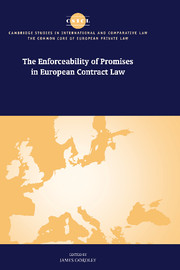Book contents
- Frontmatter
- Contents
- General editors' preface
- List of contributors
- Table of legislation
- List of abbreviations
- 1 Some perennial problems
- 2 Contemporary solutions
- Case 1 promises of gifts
- Case 2 promises of compensation for services rendered without charge
- Case 3 promises to pay debts not legally due
- Case 4 a promise to come to dinner
- Case 5 promises to store goods without charge
- Case 6 promises to do a favour
- Case 7 promises to loan goods without charge
- Case 8 a requirements contract
- Case 9 promises to pay more than was agreed I
- Case 10 promises to pay more than was agreed II
- Case 11 promises to do more than was agreed; promises to waive a condition
- Case 12 promises to take less than was agreed
- Case 13 options given without charge
- Case 14 promises of rewards
- Case 15 promises of commissions
- 3 Comparisons
- Index by country
- Index by subject
Case 4 - a promise to come to dinner
Published online by Cambridge University Press: 18 May 2010
- Frontmatter
- Contents
- General editors' preface
- List of contributors
- Table of legislation
- List of abbreviations
- 1 Some perennial problems
- 2 Contemporary solutions
- Case 1 promises of gifts
- Case 2 promises of compensation for services rendered without charge
- Case 3 promises to pay debts not legally due
- Case 4 a promise to come to dinner
- Case 5 promises to store goods without charge
- Case 6 promises to do a favour
- Case 7 promises to loan goods without charge
- Case 8 a requirements contract
- Case 9 promises to pay more than was agreed I
- Case 10 promises to pay more than was agreed II
- Case 11 promises to do more than was agreed; promises to waive a condition
- Case 12 promises to take less than was agreed
- Case 13 options given without charge
- Case 14 promises of rewards
- Case 15 promises of commissions
- 3 Comparisons
- Index by country
- Index by subject
Summary
Case
Carlo, a famous musician, agreed to come to a dinner to be held in his honour by a private music conservatory. Two days before the dinner, he was offered a large sum of money if he would give a performance in another city the night of the dinner, taking the place of another musician who had become ill. He notified the conservatory that he could not come because he had accepted a conflicting invitation. The conservatory cancelled the dinner after it had already spent a large amount of money on publicity and food. Can the conservatory recover against Carlo?
Discussions
FRANCE
Under French law, the central issue of this case is whether Carlo's promise was legally or morally binding. French courts enforce only legal promises, and never gentlemen's agreements. In order to succeed with its claim the conservatory has to characterize Carlo's promise as a legal one. However, there are no rules whatsoever in French law to help. It is all a question of fact and is left to the lower courts' assessment. In this respect their power is absolute (appréciation souveraine), and not subject to the control of the appellate courts or the highest court, the Cour de cassation. This means that case law on the subject may be contradictory. It is therefore open to conjecture how a French court would exercise the wide discretion it has in the matter. The fact that Carlo was not given any money to come to the dinner would probably be a factor in favour of describing the promise as a purely moral one.
- Type
- Chapter
- Information
- The Enforceability of Promises in European Contract Law , pp. 105 - 117Publisher: Cambridge University PressPrint publication year: 2001

